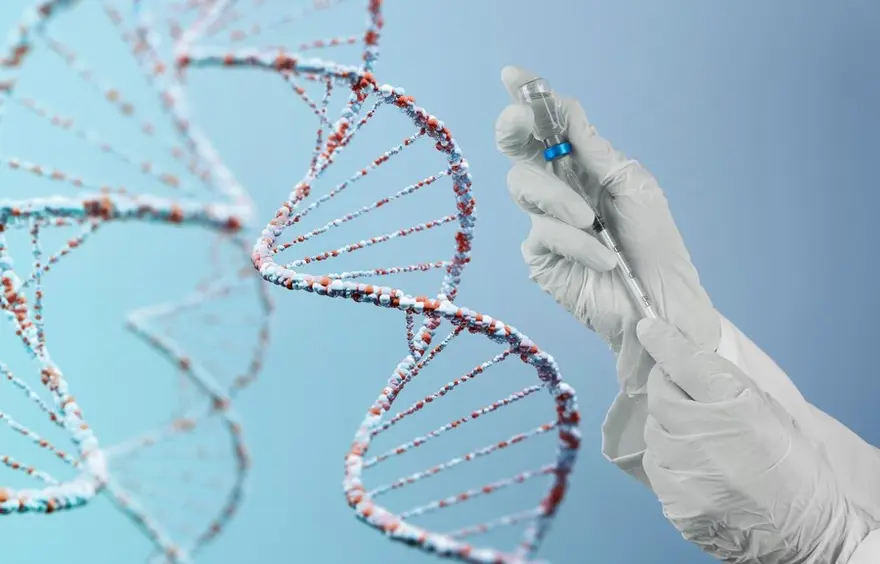Preventive Healthcare
Genetic Diseases: Symptoms, Main Causes, Types And Treatment
18035 Views
0

What are genetic disorders?
Genetic disorders result from a mutation, i.e., a harmful change in your genes or when there is a change in the number of genes. Your genes comprise deoxyribonucleic acid (DNA) that contains essential information and instructions that make you unique. Your DNA is what controls a lot of cell functions and characteristics that are inherently you.
During conception, you receive half your genes from your biological mother and the other half from your biological father; due to this, you are at risk of inheriting a mutation in your genes if one or more parents contain that mutation. A mutation in your DNA can also affect your genes, resulting in genetic disorders that are present since birth or can develop over time.
There are three main types of genetic conditions,
- Chromosomal: In this type of genetic disease, the chromosomes, which are the structure that holds your genes, are affected. In this type of genetic disease, an individual can have missing or duplicated chromosomal material.
- Multifactorial or complex: The disorder is caused by a combination of gene mutations. Other factors such as chemical exposure, certain medicines, tobacco or alcohol use, and diet can also play a role in such diseases.
- Monogenic or single-gene: The conditions in this category are caused by single-gene mutations
What are common genetic disorders?
Some of the common types of genetic disorders include
Chromosomal genetic disease list
- Klienefelter syndrome
- FragileX syndrome
- Down syndrome
- Turner syndrome
- Trisomy 18
- Trisomy 13
- Triple-X syndrome
Multifactorial Disorders
- Late-onset Alzheimers
- Arthritis
- Autism spectrum disorder (most cases)
- Cancer (most cases)
- Spina bifida
- Diabetes
- Coronary artery disease
- Migraine headaches
- Isolated congenital heart defects
Monogenic Disorders
- Congenital deafness (present since birth)
- Duchenne muscular dystrophy
- Cystic fibrosis
- Familial hypercholesterolemia (a type of high-cholesterol disease)
- Hemochromatosis (overload of iron)
- Sickle cell disease
- Neurofibromatosis
- Tay-Sachs disease
Are there other types of genetic disorders?
Many genetic diseases can also be the cause of several rare diseases. Research says that there may be more than 7,000 different types of rare genetic disorders, including
- Adrenoleukodystrophy (ALD)
- AA amyloidosis
- Ehlers-Danlos Syndrome
- Mitochondrial diseases
- Ushers syndrome
What are the causes of genetic disorders?
Learning how your genes work is the first step towards understanding what causes genetic disorders. Most of the DNA in your genes controls protein production in your body. These proteins are needed for the complicated cell interactions that keep you healthy.
Any change or mutation in your genes affects this protein-making ability, which could lead to missing proteins that are abnormal functioning of the ones you have. Here are a few environmental factors that can also result in the cause of gene mutation,
- Smoking
- Exposure to UV rays of the sun
- Exposure to radiation
- Exposure to harmful chemicals
What are the symptoms of a genetic disorder?
The symptoms of genetic abnormalities depend on several factors, such as the type of disorder, the organs affected, and the severity of the disease. Some of the common genetic disorder symptoms include
- Changes or disturbances in behaviour
- Problems breathing
- Eating and digestive issues like difficulty swallowing or inability to process nutrients effectively.
- Movement disorders because of weakness or muscle stiffness
- Poor growth or short stature
Symptoms of genetic disorders in children include
- Abnormalities in the face or limbs like missing fingers or cleft lip or palate
- Developmental delay, including speech and social skills
- Cognitive defects in which the brain doesn't process information like it should
- Vision or hearing loss
How are genetic disorders identified?
If you or your family members have a history of genetic or hereditary diseases, you may need to consider genetic counselling. To understand if you need genetic testing. Several lab tests can help show whether gene mutations are responsible for your health condition. In most cases, you may not always have a condition, even if you have a genetic mutation. A genetic counsellor can help you understand the risks and if there are any steps that you can take to protect your health.
If you have a family history of genetic disorders, getting a DNA test for genetic conditions may be an essential step required when starting a family.
These tests include
Carrier testing: A blood test is carried out to check if your partner or you are carriers for genetic disorders.
Prenatal screening: This test involves a blood test from a pregnant woman that can tell if her fetus is at risk of developing common chromosomal conditions.
Prenatal diagnostic testing: Here, you can find out if your developing fetus may have a higher risk of certain genetic disorders. For the test, a sample of your amniotic fluid is used.
Newborn screening: For this test, a blood sample will be taken from your baby and tested for genetic disorders to facilitate early diagnosis and timely treatment of genetic problems.
What is the treatment for genetic disorders like?
A genetic disorder rarely has a cure, but there are different treatment options which can help slow the progression of the disease and lessen the impact of it on your daily life. Your doctor will help you decide which is the right treatment option for you by taking into account the type of genetic disorder you have and the severity of the disease. In the case of genetic problems that do not have a treatment, you may need to be put under medical surveillance to be able to catch complications at the earliest stage.
Some of the treatment options for genetic disorders include
- Medication to manage your symptoms
- chemotherapy in the case of cancer to slow abnormal cell growth
- Nutrition counselling which helps add supplements that your body needs to your diet
- Speech, occupational, or physical therapy that maximises your abilities
- Surgeries to treat complications or repair abnormal features
- Blood transfusion for restoring healthy blood cells
- Specialised treatments like radiation treatment
- Organ transplant to replace the non-functioning organs.
How can I prevent a genetic disorder?
As a genetic disorder is engraved in your DNA, there is not much you can do to prevent it. However, you can go through genetic counselling and testing to understand the probability of developing a genetic disorder. This also helps you learn how likely you are to pass on a hereditary disease to your children.
What is the outlook for people with genetic disorders?
The outlook for individuals with genetic disorders varies depending on the kind and severity of the disease. Sometimes, the individual may need surgery to rectify an abnormality, while others may require regular specialised care to live a comfortable life.
What do I need to know about living with a genetic disorder?
Living with a genetic condition requires frequent medical needs. You will need to visit a healthcare professional who specialises in your condition, as they will most likely know the best treatment and management plan for you.
Local and national support groups are beneficial as you interact with individuals or parents of children living with such conditions. These groups help you access resources that make dealing with genetic disorders easier. Some support groups may also host events that bring together the families of individuals living with genetic conditions so you can meet people going through the same situation.
Conclusion
Mutations in your genes or chromosomes cause genetic disorders. While some show symptoms from birth, others may develop slowly over time. Genetic testing and counselling help you understand how much at risk you are of developing a genetic condition as well as how likely you are to pass this on to your offspring. Most top diagnostic centres like Metropolis Labs offer genetic testing and prenatal test packages that help you best prepare for such situations.
























